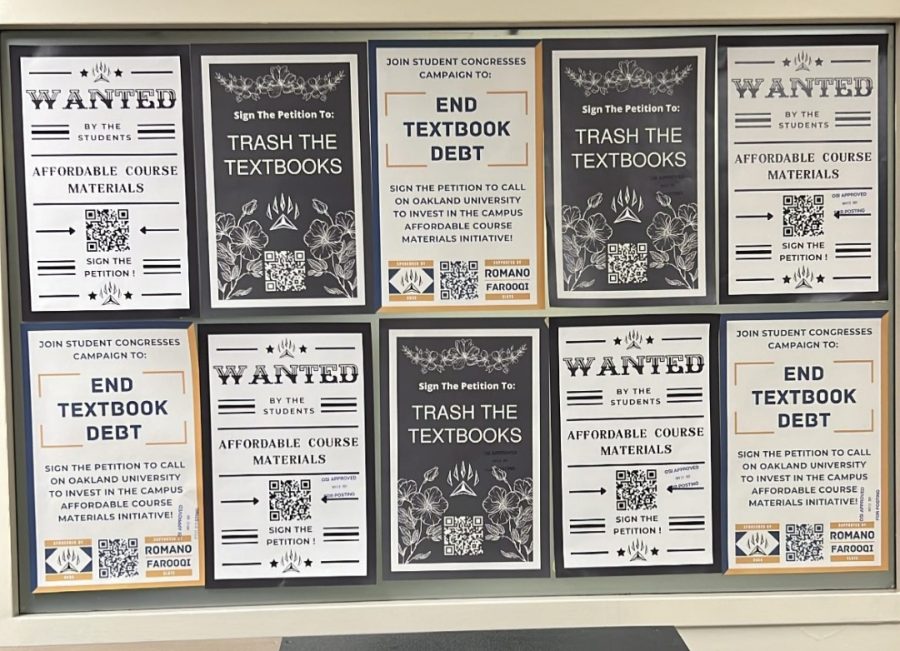Letter to the editor: Oakland University, Trash the Textbooks and Invest in YOUR Students
Photo courtesy of OUSC’s Instagram
OUSC posters promoting their new campaign to make college more affordable for OU students.
To the Oakland University Community,
Overview – Why this petition matters
The absurd cost of textbooks and other course materials at Oakland University (OU) has remained unaddressed and overlooked by the OU administration. For a self-proclaimed university “without any hidden fees,” there exists an overwhelming additional cost of attendance, especially for students who are struggling to pay for the baseline tuition rate, a rate that continues to climb. Every semester, students are left with a choice: purchase their textbooks at the cost of added student debt, or risk not buying the textbook and facing the academic consequences reflected in their grades. Fortunately, OU has the opportunity to change this and make course materials more affordable for every student in the future. Members of the OU community have proposed solutions to reduce the cost of course materials, but until now, they have been met with little support. We, the students and all of the OU community, are standing up today to urge the OU administration to invest in the Affordable Course Materials Initiative (ACMI) and work to implement Inclusive Access by investing $250,000 in cost reducing programs.
Affordable Course Materials Initiative (ACMI)
The ACMI is a program that provides professors with the funding to convert their courses to using low-cost or no-cost course materials. A common solution has been the use of Open Educational Resources (OER), a program that provides teaching, learning, and research resources under an open license that allows for free use. At OU, the infrastructure for the ACMI program already exists, the only thing missing is funding from the University. Regrettably, in the four years of the program’s existence they have only received $5,000.00 from the OU administration. At a University with 17,170 students, investing less than half of what one student pays in tuition is not enough. ACMI has proven its effectiveness by collectively saving students between $14,668.61 – $40,180.80 (each semester) after investing the one-time contribution from the university.
The ACMI program cannot continue to facilitate the conversion of courses without the proper funding to provide faculty with the necessary stipends to do so. Investing in similar programs has already happened at other institutions in Michigan. For example, Wayne State has spent $55,000 since the inception of its programs, Michigan State University invests $50,000 annually, and Lansing Community College received a one time funding of $500,000 from their Board of Trustees for their initiative. OU is not doing enough to ensure that students have access to every necessary resource for their success – more must be done.
Inclusive Access
When courses cannot be converted to no-cost or low-cost, an alternative option students can utilize is discounts on course materials through an inclusive access program. Inclusive Access is an umbrella term for textbook programs where students can opt in (or out) to have their course materials purchased when they pay for tuition. The program buys students’ textbooks in bulk which allows for them to be 40-80% cheaper than students purchasing individually. Additionally, students who choose to participate in this service may be able to have the costs of their textbooks covered by their financial aid and/or scholarships. Students would be able to collect their textbooks on the first day of classes, ensuring they get the correct materials on time. An inclusive access program at OU
Wayne State University, Central Michigan University, and Michigan Technological University have implemented similar inclusive access programs that allow for a student’s financial aid to cover the cost of course materials, an option not present at OU. The creation of a similar inclusive access program at OU would provide an essential safety net for all students.
Conclusion
As we approach the Winter Semester, students will have to empty their wallets again to purchase textbooks, access to online homework, and all other course materials necessary for their academic success – this is an avoidable and unnecessary cost that breaks the bank for hundreds of students every semester. For OU to be more inclusive and welcoming, values they claim they wish to embrace, they must invest in reducing these costs.
If OU wishes to be a “school of choice,” there must be an investment in programs that make it competitive. The massive costs that students are required to take on and the low wages paid to student employees makes OU an unattractive institution for prospective students and financially untenable for current ones. If OU wants to support their students financially to afford the cost of higher education, it needs to invest in programs that reduce the costs associated with education. If OU cares about preparing for students’ futures, it needs to prioritize reducing student debt. If OU wants to work towards eliminating the disparate graduation rates of students from marginalized communities, an investment is necessary.
The infrastructure is built, the organizing is done, the experts needed are on standby, and the demand among students is enormous. All that is needed is an investment by OU administration that is dedicated to reducing the cost of education for all students at our university. We urge Oakland University to provide $250,000 in funding for these cost reducing programs.
Students need this, the ball is in your court.
Signed,
The Oakland University Student Congress
Here’s the link to OUSC’s petition.
Letters to the editor can be submitted to [email protected].







Mike • Nov 24, 2021 at 3:34 PM
You’re all idiots. textbooks are expensive because the personnel required to make them are highly trained and specialized individuals that often dedicate decades of their lives to make them. if you’re complaining about the “hidden cost” that signals to me you’re foolish. It is common knowledge textbooks are expensive and the required materials are posted ahead of the class starting. if you arw so woefully unprepared that you havent allocated money to purchase the books then you are making a bet and need to accept the consequences thereof.
There are several alternatives to purchasing new materials such as purchasing a book from someone who has already taken the class, most people have friends after all. purchase an older edition, purchase te international or soft cover editions. buy the PDFs (or if youre a scum bag pirate them), or rent the books
Anonymous • Nov 24, 2021 at 10:30 PM
No one disagrees that textbooks take smart individuals to make, but oftentimes, the people writing textbooks are professors also being exploited by their universities. Also, if the university CLEARLY has the money to help students afford course materials, why not do it? Students pour an astronomical amount of money into OU just to have to pay even more for textbooks. You can’t blame someone for having a hard time paying $10,000 each semester.
This kind of rhetoric is foolish. Everyone is struggling financially, and rather than get financial assistance, we get a house tour from President Pescovitz. They have the money to help students, its time they do. Stop defending them while they exploit you.
Mike • Dec 9, 2021 at 12:48 PM
By going to college (a massive expense) you’re signaling by registering for classes you accept the cost of them. OU doesnt bombard you with hidden fees (maybe a lab fee here and there). Attending and institution for higher education is a luxury that comes from the excess produced in our lives. If you are struggling financially then it is poor decision making on your part to continue to attend college, no one elses.
you can fund education multiple ways such as scholarships, working, getting married and sharing expenses, take fewer classes, reconsider if your major is economically viable, borrow debt, join the military, find company sponsor, etc. To ignore the opportunities in front of you and to continue complaining about expenses you sign up for is the manifestation of the term “Have your cake and eat it too”.
It would be like taking out a 300,000 mortgage when you only make 40,000 per year and wondering why in 3 years it was repossessed.
As far as The president is concerned she is the French royalty saying to the people “Let them eat cake” as they gather around the palace. I could paint a description of her with many colorful words but i will leave it at she is not fit to be president. her timing of her YT video for TG was AWFUL. I feel like i am living in a Babylon Bee article or Onion article. She takes a dump on the faculty, BRAGS ABOUT THE NET POSITION OF THE UNIVERSITY INCREASING, raises tuition, complains she doesn’t get enough money from the state, and then does a Mansion tour. I understand it isnt hers and it is the university’s but the optics are very bad
John Sanchez • Nov 28, 2021 at 3:08 PM
Unfortunately the online passcodes that you need for a lot of classes for Pearson Education textbooks requires you to buy it directly from them. The online codes can be almost $100 themselves. Getting used textbooks used to be more of an option.
Mike • Dec 9, 2021 at 12:50 PM
Online passcodes are definitely annoying especially when a prof doesnt tell you that they are required. When i was in undergrad I had to purchase a TB for but $400 but i knew ahead of time and found one for around $80. first day of class i am told i need the code and found out it was $250. i was displeased.
Anonymous • Nov 24, 2021 at 9:36 AM
How could I recommend OU to any new students with WSU and MSU dedicating tens of thousands more $ to free textbooks than us? Instead of real help we get a house tour… ridiculous
Anon • Nov 24, 2021 at 1:20 AM
Most students I know have at least one class a semester where they don’t buy the textbooks. Why are we allowing financial access divide our students. This needs to end, let’s trash the textbooks.
Disappointed Student • Nov 23, 2021 at 7:50 PM
Embarrassing that University Administration has only put $5,000.00 to this initiative. But, ya know so glad I got to see Ora’s house in a video the other day. Really speaks to her priorities.